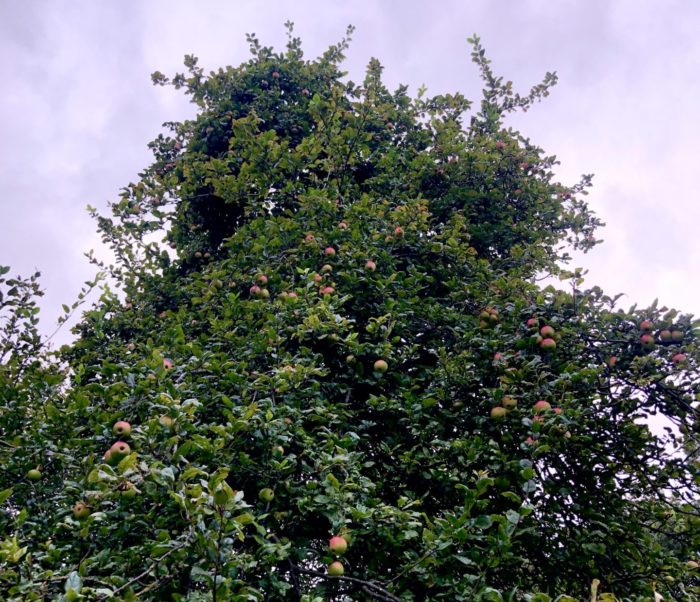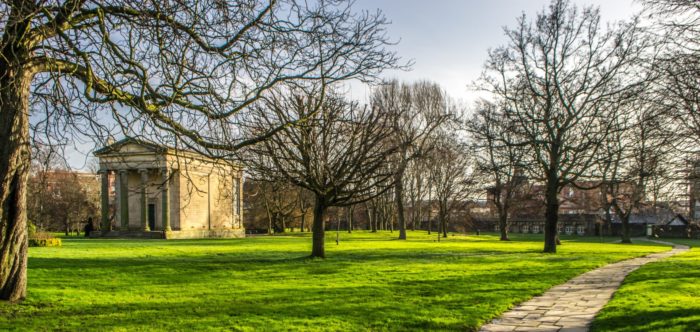Apple Day 2021
It seems like every day is official ‘something’ day, but Thursday 21st October is officially Apple Day!

Apples are actually part of the rose family of plants, and whilst they are cultivated worldwide, they are intrinsic to British food culture. They’re delicious eaten fresh, transformed into apple sauce with your roast dinner, baked in apple crumble, turned into toffee apples for bonfire night or made into a glass of fresh apple juice or cider to wash it all down with. October is the perfect time for picking ripe apples from the tree before the weather turns and the fruit starts to spoil.
Apples on campus
Did you know we have apple trees on campus and – perhaps more importantly - that you’re welcome to pick your own?
Our apple trees contribute towards the biodiversity on campus, and form part of a wider edible campus alongside other fruit trees like plums and damsons. There are also more unusual fruit varieties you can hunt out such as mulberry and 19th century favourite ‘medlar’, as well as edible nuts, berries and herbs.
An English apple variety ‘Discovery’ was planted on campus on Earth Day to celebrate the launch of the Priestley International Centre for Climate. But for the best selection of apples on campus – a genuine orchard (which is defined as at least five trees) – then you should head to St George’s Field. This idyllic green space is right in the heart of the campus but many people don’t realise it’s there.

St George’s Field is a great spot to get away from the hustle and bustle of city life and unwind, and at this time of year is full of emerging autumn colour. It’s also home to some of our campus honey bees, along with some of the most valuable trees on campus in terms of carbon storage and sequestration (how much carbon they take in from the air). The largest tree on campus is also in here – it should be easy enough to spot!
Forage responsibly!
If you’ve never foraged before then some basic rules apply. Only pick from public land or where you have the landowner’s permission; only take what you need for yourself - leave enough behind for others and for nature; and don’t cause any damage.
Don’t get yourself into any precarious positions where you might injure yourself, and make sure you know what it is you’re picking – not everything that grows is good for you! It's recommended to wash the food you've picked before eating - you can always refill a water bottle on campus.
Learn more about responsible foraging here.
Hungry for more?
Campus isn’t the only place to find apple trees – LUU’s Green Action Society have an allotment on Woodhouse Moor where you can get involved in growing food, and there is also a community orchard in Headingley, as well as a host of other organisations involved in growing food across Leeds.
On campus, the Sustainable Garden next to Roger Stevens is about to undergo redevelopment following a COVID-19 enforced break from volunteering activities, so watch this space and the Sustainability social channels for more information on this.
If you want to find more edibles closer to you, or you’re looking for something to go in your crumble, then Feed Leeds have created these awesome edible campus maps to help you track down whatever you’re after.
Got your own apple tree? Lucky you!
If you're lucky enough to have an apple tree in your garden, you might find yourself with a glut of fruit that no amount of crumble baking will address.
Rather than let it spoil on the tree or the ground, you can take the fruit to Leeds Urban Harvest who will turn it into apple juice and cider. For every crate of fruit you donate you’ll get your own bottle of apple juice or cider made from this year’s harvest. You can also get involved in the production yourself through their volunteering sessions.
Keep up to date on the latest news
-
- Follow us on Twitter: @UoL_Sus
- Follow us on Instagram: @uol_sus
- Follow us on Facebook: @UoLSustainability
- Sign up to our Sustainability newsletter
United Nations Sustainable Development Goals
We use the United Nations Sustainable Development Goals (SDGs) as a framework to guide our activity. Our work on being active in Leeds is linked to the following SDGs:
-
-
- Goal 3: Good health and Wellbeing
- Goal 11: Sustainable Cities and Communities
-
Find out more about our impact on the SDGs.
